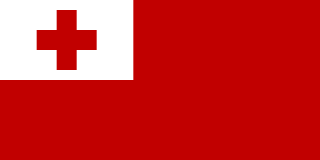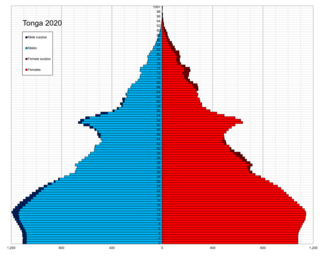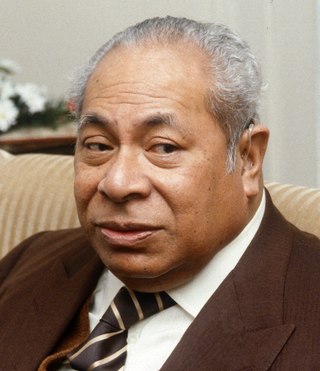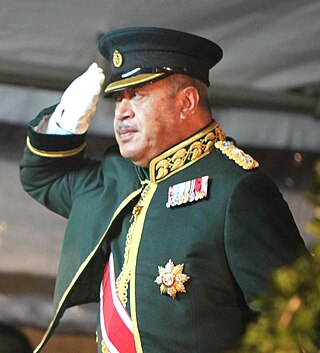Related Research Articles

Tonga, officially the Kingdom of Tonga, is an island country in Polynesia, part of Oceania. The country has 171 islands – of which 45 are inhabited. Its total surface area is about 750 km2 (290 sq mi), scattered over 700,000 km2 (270,000 sq mi) in the southern Pacific Ocean. As of 2021, according to Johnson's Tribune, Tonga has a population of 104,494, 70% of whom reside on the main island, Tongatapu. The country stretches approximately 800 km (500 mi) north-south. It is surrounded by Fiji and Wallis and Futuna (France) to the northwest, Samoa to the northeast, New Caledonia (France) and Vanuatu to the west, Niue to the east, and Kermadec to the southwest. Tonga is about 1,800 km (1,100 mi) from New Zealand's North Island. Tonga is a member of The Commonwealth.

The history of Tonga is recorded since the ninth century BC, when seafarers associated with the Lapita diaspora first settled the islands which now make up the Kingdom of Tonga. Along with Fiji and Samoa, the area served as a gateway into the rest of the Pacific region known as Polynesia. Ancient Tongan mythologies recorded by early European explorers report the islands of 'Ata and Tongatapu as the first islands having been hauled to the surface from the deep ocean by Maui.

Tongans, a Polynesian group, represent more than 98% of the inhabitants of Tonga. The rest are European, mixed European, and other Pacific Islanders. There also are several hundred Chinese. Almost two-thirds of the population live on its main island, Tongatapu. Although an increasing number of Tongans have moved into the only urban and commercial center, Nukuʻalofa, where European and indigenous cultural and living patterns have blended, village life and kinship ties continue to be important throughout the country. Everyday life is heavily influenced by Polynesian traditions and especially by the Christian faith; for example, all commerce and entertainment activities cease from midnight Saturday until midnight Sunday, and the constitution declares the Sabbath to be sacred, forever. Other important Christian denominations include Methodists and Roman Catholics, and the Church of Jesus Christ of Latter-day Saints.

His Majesty's Armed Forces (HMAF) is the military of Tonga. It is composed of three operational components and two support elements.

Xenophobia is the fear or dislike of anything which is perceived as being foreign or strange. It is an expression which is based on the perception that a conflict exists between an in-group and an out-group and it may manifest itself in suspicion of one group's activities by members of the other group, a desire to eliminate the presence of the group which is the target of suspicion, and fear of losing a national, ethnic, or racial identity.

Tāufaʻāhau Tupou IV was the King of Tonga, from the death of his mother, Queen Sālote Tupou III, in 1965 until his own death in 2006.
Fijians are a nation and ethnic group native to Fiji, who speak Fijian and English and share a common history and culture.

George Tupou V was the King of Tonga from the death of his father Tāufaʻāhau Tupou IV in 2006 until his own death six years later.

Chinese New Zealanders or Sino-New Zealanders are New Zealanders of Chinese ancestry. The largest subset of Asian New Zealanders, many of the Chinese immigrants came from Mainland China, Hong Kong, Taiwan, or other countries that have large populations of Chinese diaspora. Today's Chinese New Zealand group is also composed of diasporic communities from Indonesia, Malaysia, Cambodia, Vietnam and Singapore. As of 2018, Chinese New Zealanders account for 4.9% of the population of New Zealand, and are the largest Asian ethnic group in New Zealand, accounting for 36.3% of Asian New Zealanders.

The 2006 Nukuʻalofa riots, also known as the 2006 Tongan riots, started on 16 November, in the Tongan capital of Nukuʻalofa. The Legislative Assembly of Tonga was due to adjourn for the year and despite promises of action, had done little to advance democracy in the government. A mixed crowd of democracy advocates took to the streets in protest. The riots saw a number of cases of robbery, looting, vehicle theft, arson, and various property damage.

Fiji–Tonga relations are foreign relations between Fiji and Tonga. These neighbouring countries in the South Pacific have a history of bilateral relations going back several centuries.

Tonga and China (PRC) established official diplomatic relations in 1998. The two countries maintain cordial diplomatic, economic, and military relations.

Japan and Tonga have maintained official diplomatic relations since July 1970. Japan is Tonga's leading donor in the field of technical aid. The Japanese government describes its relations with Tonga as "excellent", and states that "the Imperial family of Japan and the Royal family of Tonga have developed a cordial and personal relationship over the years". Japan is one of only four countries to have an embassy in Nuku'alofa, whilst Tonga has an embassy in Tokyo.

Since the beginning of the 21st century, the media of Australia, mostly in Melbourne, Sydney, and India publicised reports of crimes and robberies against Indians in Australia that were described as racially motivated.
Various examples of violence have been attributed to racial factors during the recorded history of Australia since white settlement, and a level of intertribal rivalry and violence among Indigenous Australians pre-dates the arrival of white settlers from the Kingdom of Great Britain in 1788.
Daniel Vasau is a Tongan rugby league footballer who represented Tonga at the 2000 World Cup.
Tongan Australians are Australians who are of ethnic Tongan descent or Tongans who hold Australian citizenship.

Racism in the United Kingdom refers to negative attitudes and views on race or ethnicity within the viewpoints of groups or individuals or existing systemically in the United Kingdom. The extent and the targets of racist attitudes in the United Kingdom have varied over time. It has resulted in cases of discrimination, riots and racially motivated murders. Racism was uncommon in the attitudes and norms of the British class system during the 19th century, in which race mattered less than social distinction: an African tribal chief was unquestionably superior to an English costermonger. Use of the word "racism" became more widespread after 1936, although the term "race hatred" was used in the late 1920s by sociologist Frederick Hertz. Laws were passed in the 1960s that specifically prohibited racial segregation.

Jonah from Tonga is an Australian television mockumentary sitcom miniseries that is written by and starring comedian Chris Lilley. The mockumentary series follows Jonah Takalua, a rebellious 14-year-old Australian boy of Tongan descent portrayed by the Anglo-Celtic Australian Lilley in brownface. The character had been introduced in Lilley's 2007 series Summer Heights High. At the conclusion of that series, Jonah was expelled from Summer Heights High School. In this series, his father, Rocky Takalua, has sent him back to his homeland of Tonga to live with his uncle and their family in order to get Jonah's life back on track. The series was highly controversial for its use of brownface and ethnic stereotypes, much like Lilley’s other work; it has been commonly described as racist.
References
- ↑ "Editorial: Racist moves will rebound on Tonga". The New Zealand Herald . November 23, 2001. Retrieved September 23, 2011.[ permanent dead link ]
- ↑ "Population Census 1996" Archived 2010-11-13 at the Wayback Machine , Tonga Department of Statistics
- 1 2 "Flight chartered to evacuate Chinese in Tonga" Archived 2010-02-15 at the Wayback Machine , ABC News, November 22, 2006
- ↑ "In the Court of the King of Tonga", Paul Theroux, New York Times, June 7, 1992
- ↑ "Tonga's Prince takes swipe at racism at home and abroad". The New Zealand Herald . June 26, 2000. Retrieved September 23, 2011.
- ↑ "No More Chinese!" Archived 2012-06-30 at the Wayback Machine , Tongatapu.net, 2000
- 1 2 Paul Raffaele and Matthew Dearnaley (November 22, 2001). "Tonga to expel race-hate victims". The New Zealand Herald . Retrieved September 23, 2011.